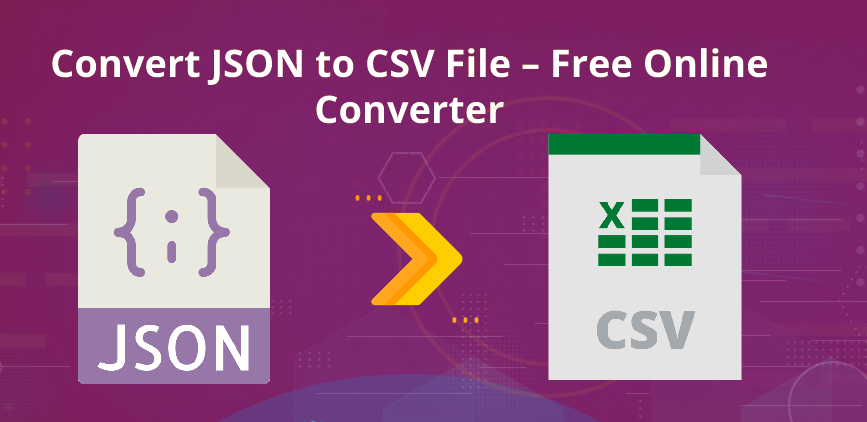The Ultimate Guide to Using the JSON to CSV Tool
In today’s data-driven world, the ability to efficiently convert data from one format to another is crucial. JSON (JavaScript Object Notation) and CSV (Comma-Separated Values) are two widely used data formats, each with its own advantages. JSON is favored for its readability and ease of use in web applications, while CSV is a staple in data analysis and management due to its simplicity and compatibility with various software. Converting JSON to CSV can streamline your data workflow, making it easier to analyze and manipulate data. This guide will walk you through the benefits and process of using our JSON to CSV Tool, available at webjoom.com/tools

Why Convert JSON to CSV?
Improved Data Handling
CSV files are universally compatible with numerous data management tools, including Excel, Google Sheets, and various database systems. This compatibility allows for seamless data handling, making it easier to perform data analysis, create visualizations, and generate reports.
Simplified Data Structure
While JSON is excellent for hierarchical data structures, CSV provides a more straightforward, tabular format. This simplicity makes it easier to understand and manipulate data, especially for users who are more familiar with spreadsheets.
Enhanced Data Sharing
CSV files are lightweight and easy to share across different platforms and devices. They can be easily imported into various applications, facilitating better data collaboration and sharing.
Features of Our JSON to CSV Tool
User-Friendly Interface
Our JSON to CSV Tool is designed with simplicity in mind. The intuitive interface ensures that even users with minimal technical knowledge can convert their data with ease.
Fast and Efficient Conversion
The tool is optimized for speed, allowing you to convert large JSON files to CSV format in seconds. This efficiency is crucial for professionals who need to process large datasets quickly.
Secure and Confidential
We prioritize your data security. Our tool does not store your data, ensuring that your information remains confidential throughout the conversion process.
Customizable Output
Our tool offers various customization options, allowing you to tailor the CSV output to your specific needs. You can select which fields to include, reorder columns, and more.
How to Use the JSON to CSV Tool
Using our JSON to CSV Tool is straightforward. Follow these simple steps to convert your JSON data:
-
Access the Tool Visit webjoom.com/json-to-csv to access the tool.
-
Upload Your JSON File Click the “Upload JSON File” button to select the JSON file you want to convert. Alternatively, you can paste your JSON data directly into the provided text box.
-
Customize Your Output Use the customization options to select the fields you want to include in the CSV file. You can also reorder the columns as needed.
-
Convert the Data Click the “Convert” button to start the conversion process. The tool will quickly process your data and generate a CSV file.
-
Download Your CSV File Once the conversion is complete, click the “Download CSV” button to save the file to your device.
Best Practices for Data Conversion
Validate Your JSON Data
Before converting your JSON data, ensure that it is properly formatted and free of errors. This step will help prevent conversion issues and ensure accurate results.
Review the CSV Output
After converting your JSON data, review the CSV file to ensure that all fields have been correctly mapped and that the data is accurate. This review is especially important for large datasets.
Use Consistent Field Naming
When preparing your JSON data, use consistent field names to make the conversion process smoother. Consistent naming helps avoid confusion and ensures that the data is correctly mapped.
Common Use Cases for JSON to CSV Conversion
Data Analysis
CSV files are ideal for data analysis. Converting JSON data to CSV allows you to leverage powerful data analysis tools like Excel, Google Sheets, and specialized software for in-depth analysis.
Database Management
CSV files can be easily imported into various database systems, facilitating better data management and organization. This capability is particularly useful for managing large datasets in a structured format.
Reporting and Visualization
CSV’s tabular format makes it easy to create reports and visualizations. By converting JSON to CSV, you can generate clear, concise reports and visual representations of your data.
Conclusion
Converting JSON to CSV is a critical task for many data professionals. Our JSON to CSV Tool simplifies this process, offering a fast, efficient, and user-friendly solution for all your data conversion needs. Whether you’re analyzing data, managing databases, or creating reports, our tool ensures that your data is accurately and efficiently converted. Try our JSON to CSV Tool today at webjoom.com/json-to-csv and experience the benefits for yourself.